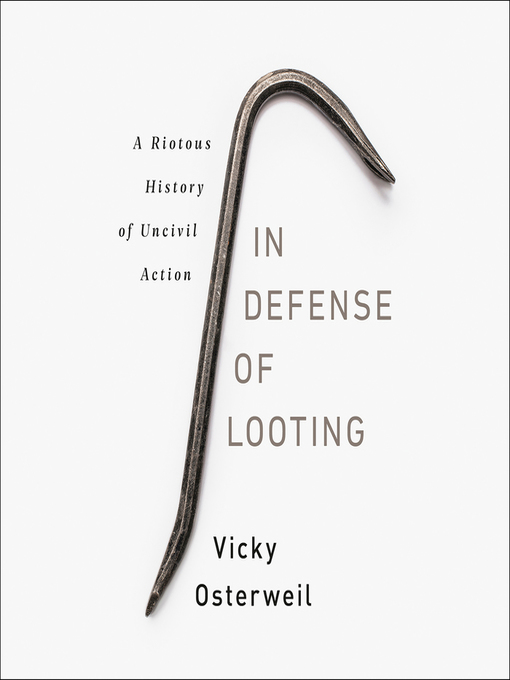In Defense of Looting
A Riotous History of Uncivil Action
Looting — a crowd of people publicly, openly, and directly seizing goods — is one of the more extreme actions that can take place in the midst of social unrest. Even self-identified radicals distance themselves from looters, fearing that violent tactics reflect badly on the broader movement.
But Vicky Osterweil argues that stealing goods and destroying property are direct, pragmatic strategies of wealth redistribution and improving life for the working class — not to mention the brazen messages these methods send to the police and the state. All our beliefs about the innate righteousness of property and ownership, Osterweil explains, are built on the history of anti-Black, anti-Indigenous oppression.
From slave revolts to labor strikes to the modern-day movements for climate change, Black lives, and police abolition, Osterweil makes a convincing case for rioting and looting as weapons that bludgeon the status quo while uplifting the poor and marginalized. In Defense of Looting is a history of violent protest sparking social change, a compelling reframing of revolutionary activism, and a practical vision for a dramatically restructured society.
-
Creators
-
Publisher
-
Release date
August 25, 2020 -
Formats
-
OverDrive Listen audiobook
- ISBN: 9781549161193
- File size: 284616 KB
- Duration: 09:52:56
-
-
Languages
- English
-
Reviews
-
Kirkus
August 1, 2020
A charged, controversial manifesto in support of rioting and looting as instruments of rebellion. Rioting and looting, writes Osterweil, bring liberals and conservatives into agreement: Conservatives root for the police while liberals, "because their love for law and order is much greater than their belief in freedom," dismiss looters as bringing destruction on their own community. The thought that liberals are more committed to law and order than to freedom seems inapposite, the kind of thing radicals say to denigrate those less fervently committed to the cause. However, Osterweil scores points by noting, with particular respect to the weekslong riots in Ferguson, Missouri, in 2014, that the inner-city proletariat seldom owns any real property in their own communities and that "the same white liberals who inveigh against corporations for destroying local communities are aghast when rioters take their critique to its actual material conclusion." Considering looting to be an impromptu means of wealth redistribution that she likens, curiously and unpersuasively, to the potlatch of Native peoples in the Pacific Northwest, Osterweil also describes it as an undeniable way to draw attention. Mounting a so-called peaceful protest will simply result in being ignored, and regardless, "there is no such thing as peace under current conditions. Social peace is just the condition under which patriarchal white supremacist violence is acting most fluidly and most thoroughly and is distributed most invisibly. When the white supremacist violence appears in the streets, it is not an aberration or a dramatic change of direction: it is a continuation of the world as it is in more direct, open terms." The author's long disquisitions on the history of slavery and lynching are accurate but not entirely necessary to her argument that nonviolence plays into the hands of the powerful. An argument that, while debatable and occasionally strident, is worth hearing out.COPYRIGHT(2020) Kirkus Reviews, ALL RIGHTS RESERVED.
-
Publisher's Weekly
August 24, 2020
The New Inquiry contributor Osterweil debuts with a provocative, Marxist-informed defense of looting as a radical and effective protest tactic. Osterweil argues that the surplus wealth that allowed capitalism and modern property rights to flourish only existed because European colonialists in the New World stole land from and committed genocide against Indigenous peoples and enslaved Africans in order to produce the commodities (silver, sugar, tobacco, cotton) that created that surplus. Therefore, Osterweil contends, when protestors loot and riot as part of an anti-police uprising, they are confronting and exposing the inextricable links between America’s economic and social structures and white supremacy. Moreover, in her analysis, the “threat” that looting and rioting pose to the established order is necessary “to overturn this miserable world of white supremacy, anti-Blackness, cisheteropatriarchy, capitalism, empire, and property.” Osterweil supports her claims with close looks at 1960s uprisings in Detroit, Newark, and Watts and the 1992 L.A. riots that broke out after police officers accused of brutalizing Rodney King were acquitted. Her inflammatory rhetoric (she calls police a “despicable occupying army”) and vague conception of what her called-for revolution would look like undermine her more credible historical interpretations. Still, this is a bracing rethink of the goals and methods of protest.
-
Loading
Why is availability limited?
×Availability can change throughout the month based on the library's budget. You can still place a hold on the title, and your hold will be automatically filled as soon as the title is available again.
The Kindle Book format for this title is not supported on:
×Read-along ebook
×The OverDrive Read format of this ebook has professional narration that plays while you read in your browser. Learn more here.


